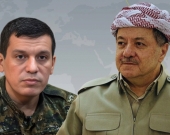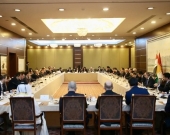Five Arab states top the most corrupt list

The list, published on Tuesday, ranks countries on an index score that relates to perceptions of the degree of corruption as seen by country analysts and business people, and ranges between zero, which is highly corrupt, and 100, which is very clean.
Syria, Iraq, Libya, Somalia and Sudan all scored less than 20, as their governments deal with massive instability in the face of civil war and armed groups, or nations where the lead researcher of the study said the regime is not "functioning effectively".
"Corruption is very much linked to countries that fall apart, as you see in Libya, Syria, two of the countries that deteriorated the most," Finn Heinrich told AFP news agency. "These are not countries where the government is functioning effectively, and people have to take all means in order to get by, to get services, to get food, to survive."
But the problem is not just instability, but a lack of accountability, Emad Shahin, professor of political science at the American University in Cairo said.
"There is no transparency as reflected by laws that would allow for freedom of information and people's access to it, even in Arab countries that would be considered more advanced in terms of democratic transition," Shahin told Al Jazeera, adding that "despite any kind of superficial appearances, societies in these countries also suffer from a lack of participation at all levels, from local politics to holding the judiciary responsible for governmental oversight."
"While all these factors contribute to these results, corruption as an institution in and of itself cannot be ignored, as even those who address corruption cases are often manipulating them for political reasons, and not through a systematic will to uproot it," he said.
Other countries ranked in the bottom three include Afghanistan and Somalia, where NATO and US special forces have intervened for several years now.
Afghanistan, Heinrich said, is "a sobering story. We have not seen tangible improvements".
"The West has not only invested in security but also in trying to establish the rule of law. But there have been surveys in the last couple of years showing the share of people paying bribes is still one of the highest in the world."
Widespread worldwide corruption
Meanwhile, the top 10 ranked nations include the Scandinavian countries, Switzerland, Singapore, and British commonwealth nations Canada, New Zealand and Australia.
But Huguette Labelle, the Chair of Transparency International, said that while "the top performers clearly reveal how transparency supports accountability and can stop corruption, [they] face issues like state capture, campaign finance and the oversight of big public contracts," especially with regards to corporate involvement in economic and governmental affairs.
According to Transparency International's press release, "more than two-thirds of the 177 countries in the 2013 index score below 50", indicating that public institutions in particular require more openness and transparency in the decision-making.
However, while corruption in public sectors such as political parties, the police and justice systems remains a massive challenge, according to the watchdog, "efforts to respond to climate change, economic crisis and extreme poverty will face a massive roadblock," unless "international bodies like the G20 crack down on money laundering, make corporations more transparent and pursue the return of stolen assets."
Al Jazeera












